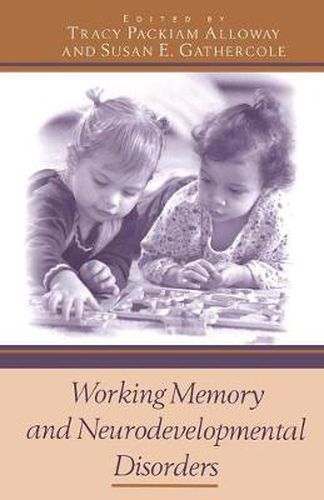Readings Newsletter
Become a Readings Member to make your shopping experience even easier.
Sign in or sign up for free!
You’re not far away from qualifying for FREE standard shipping within Australia
You’ve qualified for FREE standard shipping within Australia
The cart is loading…






Short-term or working memory - the capacity to hold and manipulate information mentally over brief periods of time - plays an important role in supporting a wide range of everyday activities, particularly in childhood. Children with weak working memory skills often struggle in key areas of learning and, given its impact on cognitive abilities, the identification of working memory impairments is a priority for those who work with children with learning disabilities.
Working Memory and Neurodevelopmental Disorders supports clinical assessment and management of working memory deficits by summarising the current theoretical understanding and methods of assessment of working memory. It outlines the working memory profiles of individuals with a range of neurodevelopmental disorders (including Down’s syndrome, Williams syndrome, Specific Language Impairment, and ADHD), and identifies useful means of alleviating the anticipated learning difficulties of children with deficits of working memory.
This comprehensive and informative text will appeal to academics and researchers in cognitive psychology, neuropsychology and developmental psychology, and will be useful reading for students in these areas. Educational psychologists will also find this a useful text, as it covers the role of working memory in learning difficulties specific to the classroom.
$9.00 standard shipping within Australia
FREE standard shipping within Australia for orders over $100.00
Express & International shipping calculated at checkout
Short-term or working memory - the capacity to hold and manipulate information mentally over brief periods of time - plays an important role in supporting a wide range of everyday activities, particularly in childhood. Children with weak working memory skills often struggle in key areas of learning and, given its impact on cognitive abilities, the identification of working memory impairments is a priority for those who work with children with learning disabilities.
Working Memory and Neurodevelopmental Disorders supports clinical assessment and management of working memory deficits by summarising the current theoretical understanding and methods of assessment of working memory. It outlines the working memory profiles of individuals with a range of neurodevelopmental disorders (including Down’s syndrome, Williams syndrome, Specific Language Impairment, and ADHD), and identifies useful means of alleviating the anticipated learning difficulties of children with deficits of working memory.
This comprehensive and informative text will appeal to academics and researchers in cognitive psychology, neuropsychology and developmental psychology, and will be useful reading for students in these areas. Educational psychologists will also find this a useful text, as it covers the role of working memory in learning difficulties specific to the classroom.